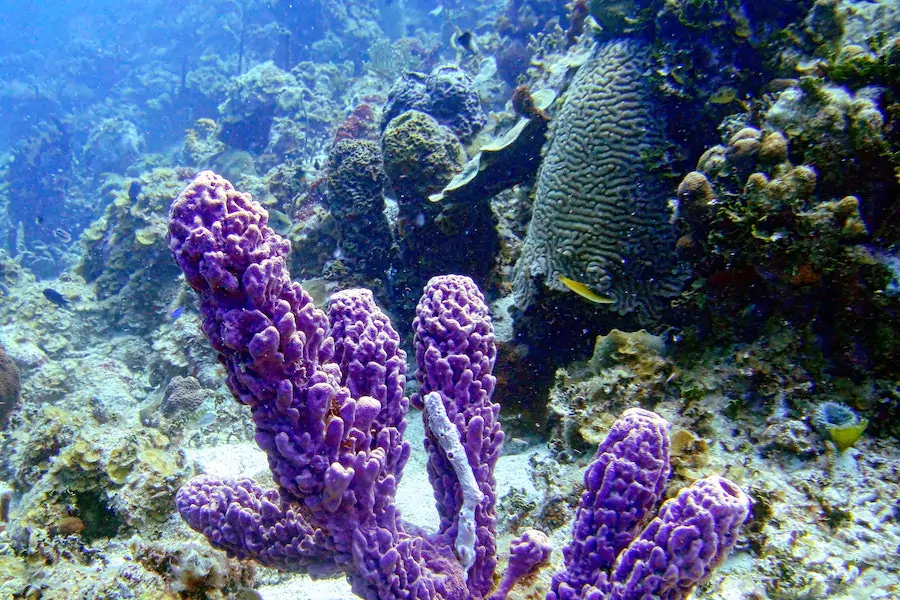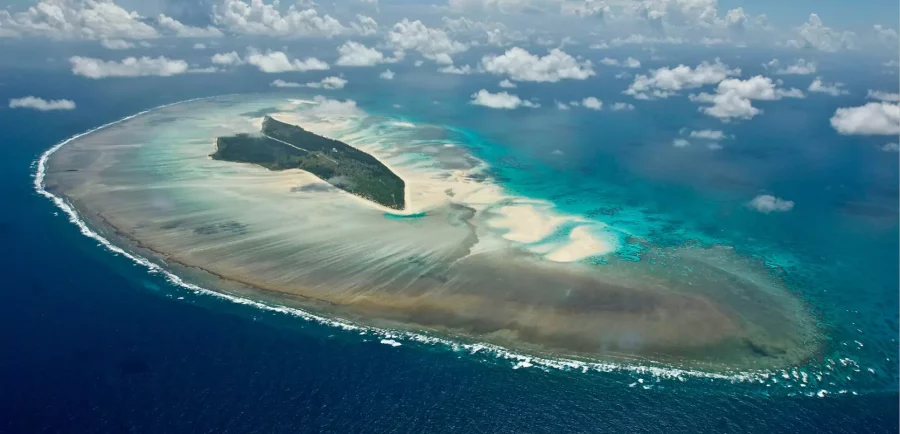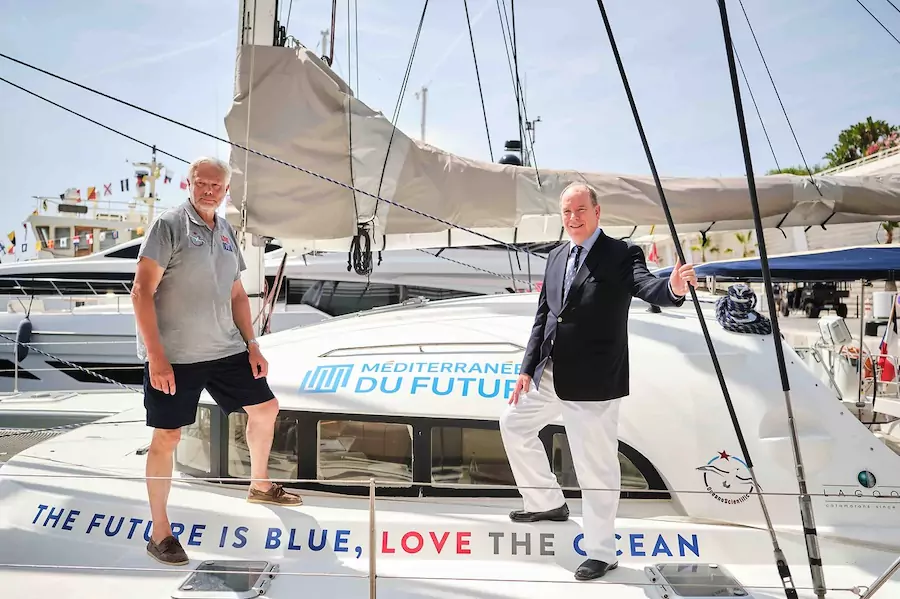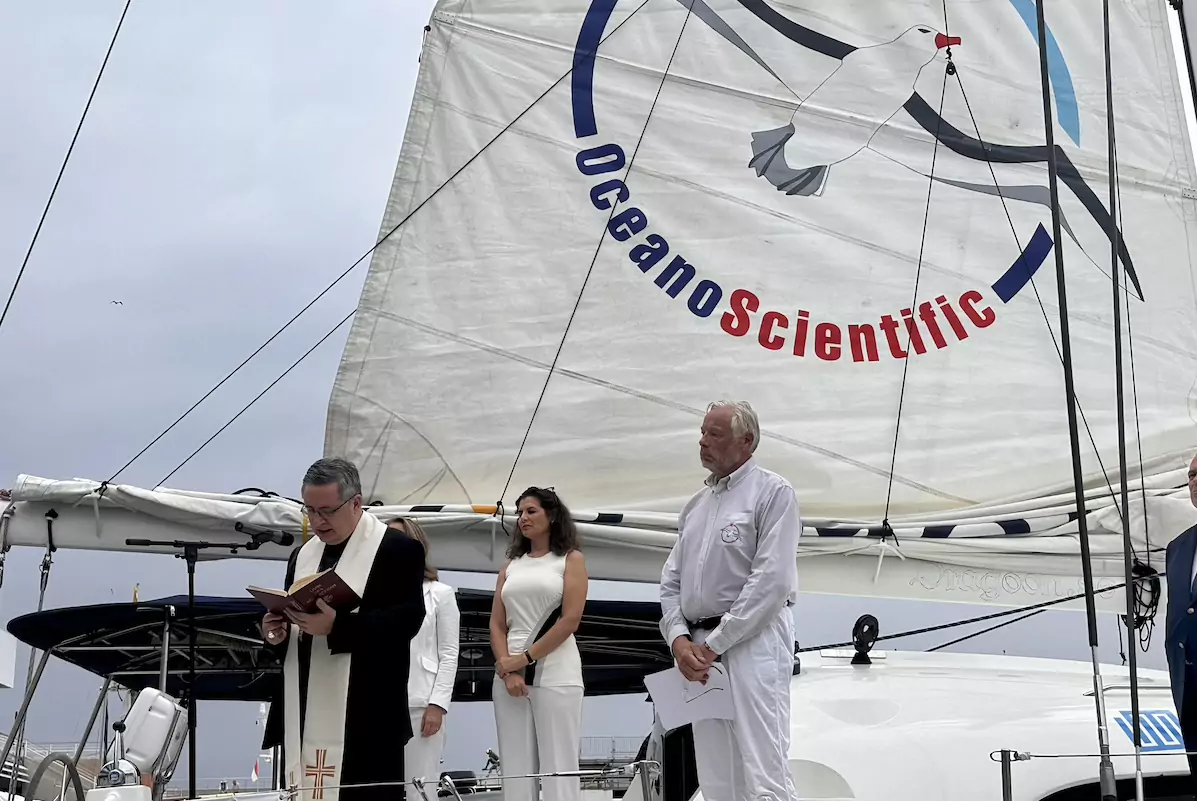Monaco’s expedition catamaran Love the Ocean has been blessed by Archbishop Dominique-Marie David ahead of its departure in September. Skippered by explorer Yvan Griboval, the boat will embark on an eight-year mission to collect data on the little-known health benefits of sea sponges to help save them from extinction.
The catamaran Love the Ocean is part of the OceanoScientific family, a philanthropic association that organises sailing expeditions that have no CO2 emissions in regions of the seas that have seldom been explored, if at all, to increase knowledge of the oceans and of the causes and consequences of climate change and pollution.
One such location is the coral reefs of Juan de Nova, located in the Mozambique Channel between Madagascar and Africa, in the Indian Ocean.
As part of the OceanoScientific Expeditions 2023-2030, Yvan Griboval will depart on 21st September from the Yacht Club de Monaco for an adventure to the Eparses Islands onboard the Love The Ocean catamaran. The aim: to collect the genetic data of different species of sponges and help prove the economic value of keeping this ancient organism, which is facing accelerated extinction, alive.

The oldest animal of the sea
Relatives of the humble sea sponge have filtered Earth’s waters for 650 million years or more, long before the first plants took to land. Their simplicity has led scientists to suggest sponges were the earliest animals to arise on our planet.
Today, the descendants of these amazing organisms are under the severe threat of the Sixth Extinction due to human activity.
OceanoScientific is therefore on a mission to help safeguard their biological heritage and preserve it for future generations.
One way of achieving this is by identifying the value that their molecules can have on human health and future new therapies.
“Let’s stop piling up alarmist scientific findings, let’s consider the Ocean as the most gigantic resource of humanity and let’s demonstrate that ecology and economy can be effectively married,” says Griboval.
“By bioprospecting little-known sponges on little-explored reefs using an oceanographic sailboat, using only three to five centimetre samples analysed biologically and genetically according to innovative techniques, we are inventing a virtuous development of an as yet unknown underwater resources, for the benefit of the sites of origin of these organisms.”

Scientific objectives
The OceanoScientific Expeditions 2023-2030 are the first sailing oceanographic campaigns in the Eparses Islands to explore all facets of sponge biodiversity. The aim is to make an inventory of species in situ by molecular extraction onboard the Love The Ocean.
The result will be a genetic database of marine organisms in the service of science, health, wellbeing and the environment. It will be a reference collection of tissues and extracts that will then be the subject of an integrative and interdisciplinary study.
The aim is to provide chemists with methods that could reproduce these molecules by biomimicry.
More than DNA collection and analysis
Every 10 seconds, the OceanoScientific System (OCS System) will be used to collect and automatically transmit every hour new data of the Air-Sea interface, feeding the international weather forecasting and operational oceanography centres and providing new information on climate in remote locations.
In addition to the oceanographic campaigns in the Eparses Islands, from May to July the explorer will also be studying the universe of sponges on the Mediterranean coasts, looking for new species, together with students.
As the future protectors of the ocean, children are a major focus of OceanoScientific. On Thursday, school children from local CM1 and CM2 classes were at the Yacht Club de Monaco to witness the blessing of Love The Ocean by Archbishop Dominique-Marie David and hear more about the expedition. Through education, the association is hoping to inspire this generation towards the New Maritime Professions in the Blue Economy, seeing the value that lies within the sea.
The blessing ceremony on Thursday ended with the singing of the ‘Anthem of the Ocean: Love the Ocean’, produced by the Oceanoscientific Monaco association and written and performed by Monegasque singe Olivia Dorato.

Backed by Monaco and Prince Albert
On Saturday 24th June, Yvan Griboval presented the 2023-2030 major initiatives of the OceanoScientific association to Prince Albert II of Monaco, as the Sovereign made a special visit to the Love The Ocean catamaran, currently moored in the Yacht Club de Monaco’s berth spaces.
Among the topics discussed was the Mediterranean Of The Future operation, to which the Principality of Monaco is committed and whose colours the Love The Ocean bears.
Make sure you’re never left out of the conversation. Sign up for the Monaco Life newsletter, and follow us on Facebook, Twitter, Instagram and LinkedIn.
SEE ALSO:
